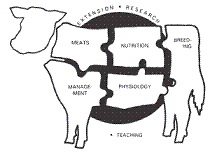Animal Science, Department of

Nebraska Beef Cattle Reports
Date of this Version
2014
Citation
2014 Nebraska Beef Cattle Report, UNL Extension MP99, pp. 129-132.
Abstract
Crossbred steers (n = 64) were grazed on warm- or cool-season grasses, without or with energy supplementation of wet distillers grains with solubles (WDGS), and were finished on a corn-based diet with or without 35% WDGS. Grass-type was the major contributor in determining the biochemical composition of L. dorsi steaks, with warm-season grasses causing increased concentrations of moisture and zinc and decreased concentrations of magnesium. Aging 28 days instead of 7 days increased pH and caused an increased concentration of carbohydrates, and non-heme and heme iron in B. femoris steaks. Diet, especially grass type, during grazing, can alter the end composition of beef.
Included in
Large or Food Animal and Equine Medicine Commons, Meat Science Commons, Veterinary Preventive Medicine, Epidemiology, and Public Health Commons


Comments
Copyright © 2014 University of Nebraska.